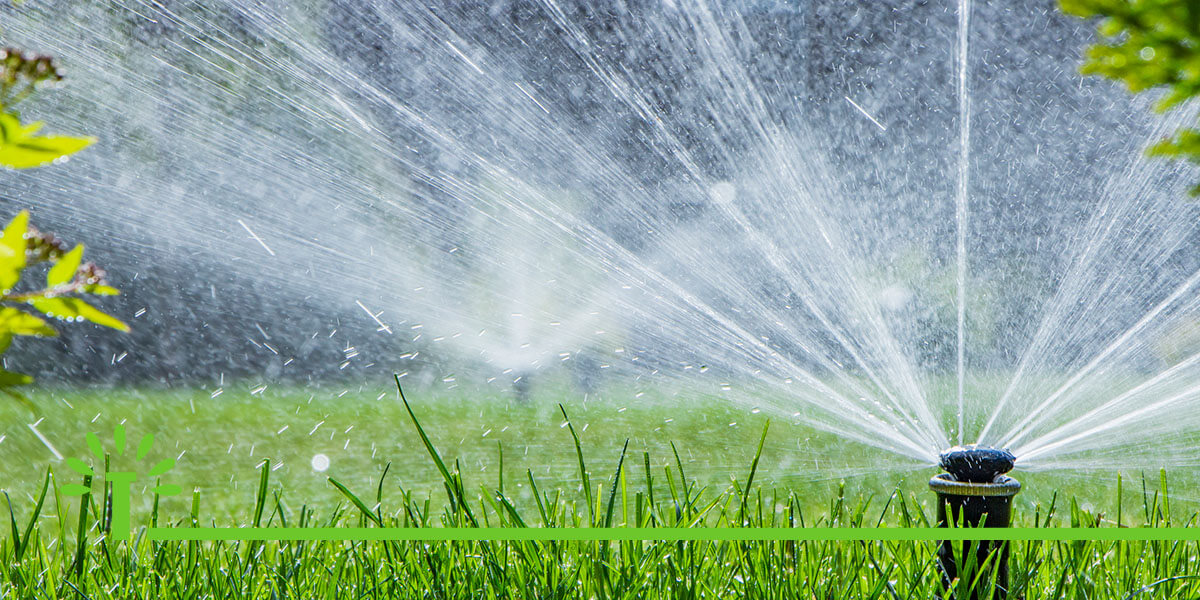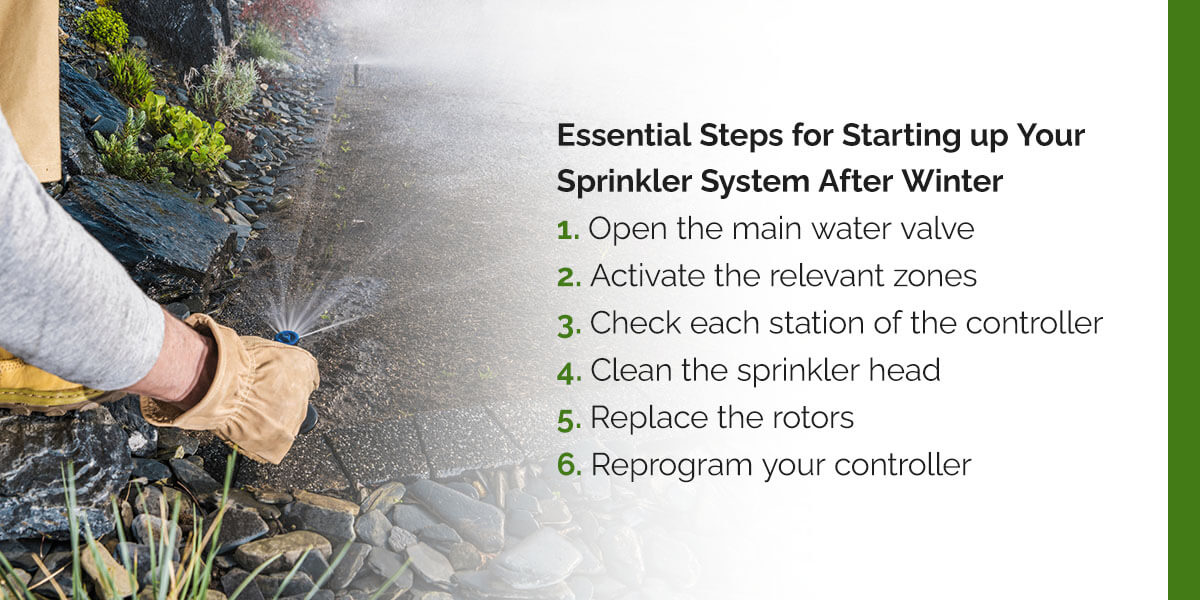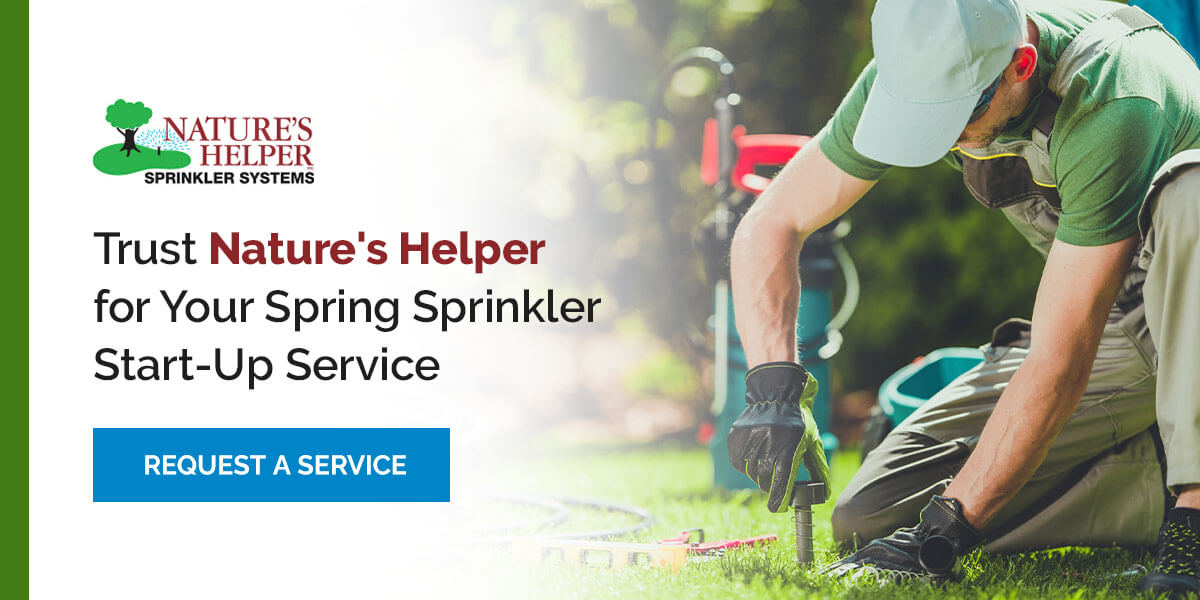Your lawn significantly impacts how visitors and passersby perceive your home, and healthy, green grass is a major part of a good-looking lawn. If you have a lawn sprinkler system, you’ll want to keep it in good shape to ensure your grass remains green and thriving come springtime.
Correctly starting your sprinkler system in spring helps ensure your sprinkler will work well for the upcoming spring and summer seasons. The start-up process includes opening the main water valve and ensuring that everything works correctly. Here’s everything you need to know about the start-up process!
Table of Contents
- Understanding the Importance of a Sprinkler Spring Start-Up for Homeowners
- Essential Steps for Starting up Your Sprinkler System After Winter
- Common Mistakes to Avoid While Starting up Your System
- Environmental and Cost-Saving Benefits of a Proper Start-Up
- Why Hiring a Professional Irrigation Contractor Is the Best Choice
- Trust Nature’s Helper for Your Spring Sprinkler Start-Up Service
Understanding the Importance of a Sprinkler Spring Start-Up for Homeowners
Knowing how to open your sprinkler system in spring before you water your lawns again after the colder months is essential. You can prevent the costs of an expensive repair with a proper post-winter start-up. One thing you have to consider is when you switch your system on. If you start up your system too early after winter, your pipes may freeze, and the cold air can cause cracks or bursts. You’ll want to wait until the freezing weather is over and the warmer temperatures prevail — so make sure to keep up to date with the weather forecast.
Essential Steps for Starting up Your Sprinkler System After Winter
Following a sprinkler spring start-up checklist will ensure your irrigation systems continue to work well and do not experience damage. Here are six steps to follow:
- Open the main water valve: Open the main water valve slowly and allow the water to start flowing through your pipes at a good pace. If you open the water valve too quickly, the pressure surge can cause your crack to burst or crack.
- Activate the relevant zones: Manually verify that all zones operate correctly. Physically set your controller and ensure everything works well and in tandem.
- Check each station of the controller: Every zone should work properly, so physically walk through the process and ensure they’re all operating smoothly. Look out for proper water pressure and adequate rotation of sprinkler heads. Also, check that the water covers enough lawn space.
- Clean the sprinkler head: Check your heads and ensure they’re adequately filtered for maximum water output. Get rid of any debris or foreign substances that can block water flow.
- Replace the rotors: Close all the flush points by replacing the rotors.
- Reprogram your controller: You want your sprinklers to work automatically, so reprogramming your controller to automatic is the next step. Remember to check its battery and replace it if necessary.
Doing a comprehensive check before you turn your sprinklers on for spring helps ensure the proper maintenance of your system.
Common Mistakes to Avoid While Starting up Your System
Some steps in the process are easy to forget, which can cause a headache in the long run. These are some common mistakes to avoid during the start-up process:
- Forgetting to inspect your backflow preventer: Winter can wreak havoc on pipes and irrigation systems. Ensure your preventer doesn’t have any cracks or damage.
- Ignoring the valve boxes: Your controller and your valve box need to be inspected for leaks.
- Sprinkling with a damaged mainline and master valve: If you have your sprinkler on and the mainline or master valve is damaged or leaky, the system has to work harder. You waste water, which will affect your water and utility bills.
- Turning on the water too quickly: Avoid turning on the main water too quickly when setting up your system after winter. A slow start ensures you ease your pipes into the process.
- Forgetting your weather sensor: If you have a weather sensor, make sure to uncover and clean it. For your sprinkler system to work effectively, every cog in the machine is essential.
- Ignoring signs of a blockage or backflow issues: If you notice spraying, misting, or pools of water around your lawn, turn off the water and inspect the cause. This preventive measure can save you repair costs later on.
Environmental and Cost-Saving Benefits of a Proper Start-Up
A healthy water sprinkler system that works adequately will save time and money while benefiting the environment. Explore the benefits of proper sprinkler start-up:
1. Minimize Damage to Ecosystems
If your pipes are leaky, you will overwater your lawn, which causes a chemical runoff. Pesticides and excessive fertilizer then seep into waterways in your area, polluting and harming sensitive ecosystems.
2. See a Reduction in Your Water Bill
Freezing winter temperatures are taxing on your pipes, and starting up your system too early can cause cracks, blisters and tears. These cracks and tears cause leakage, which wastes water. An efficient irrigation sprinkler system saves water. By preventing water runoff and improper drainage, your irrigation system uses every drop of water as it should and prevents soil degradation in your lawn.
3. Save on Electricity Costs
Irrigation systems run on electricity pumps, so if your sprinklers are inefficient, they will use more power. The start-up process keeps your pipes running smoothly and efficiently, which can help you save on electricity costs.
Why Hiring a Professional Irrigation Contractor Is the Best Choice
While you can do some smaller lawn projects on your own, a spring sprinkler start-up should be left to an irrigation specialist. There are many steps to the process, and professionals like those at Nature’s Helper have the expertise and knowledge to complete the process and look for issues an untrained eye may not pick up.
What’s more, we at Nature’s Helper know the best time to turn on sprinklers and have the requisite tools, experience and knowledge to handle any unexpected complications that may pop up during the start-up process. If something goes wrong, such as a burst or significant leak, we’ll be there, handling the situation with ease.
Trust Nature’s Helper for Your Spring Sprinkler Start-Up Service
Winter is harsh on your pipes and irrigation, as the freezing and thawing cycle can cause cracks and damage. If you turn on your water sprinkler system too early in spring, before the freezing temperatures are over, your pipes are prone to tears, breaks and bursts. Doing the start-up process yourself can be time-consuming, and if you run into damage like a burst, you may need help figuring out what to do.
At Nature’s Helper, we care for all your irrigation needs, including your spring start-up. It doesn’t matter who installed your lawn’s sprinkler system. We have the experience and knowledge to deal with any irrigation job. Founded in 1998, trust Omaha’s best sprinkler company. Request a service with us today!







